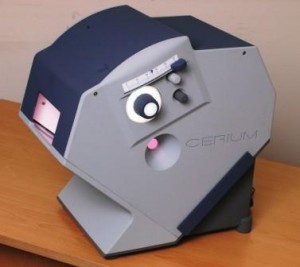Pages of print can resemble a visually stressful pattern. Print can be very “stripy” and for a lot of people can be uncomfortable to look at. This can be similar to looking at a very stripy shirt for a prolonged time. Lighting can also be a contributory factor and some people may be bothered by fluorescent lighting, glare, bright light or sunlight.
Around 35-40% of people with dyslexic difficulties are estimated to experience visual disturbance or discomfort when reading print.
B eneficial reports of the use of colour for reading difficulties came to the attention of Professor Arnold Wilkins (Head of Visual Perception Unit – University of Essex) in the early 90’s.
eneficial reports of the use of colour for reading difficulties came to the attention of Professor Arnold Wilkins (Head of Visual Perception Unit – University of Essex) in the early 90’s.
He wanted to show that the optimal colour needed to be selected with precision and to allow for this selection he invented the Intuitive Colorimeter and used the instrument to carry out scientific research. The research had full support from the Medical Research Council in the UK.
 The instrument independently changes the 3 parameters of colour, hue, saturation and brightness while the eyes are colour adapted. This will give a final colour which is extremely precise to each individuals needs. The colour will be different for each person and the precision coming from a choice of over 100,000 colour combinations
The instrument independently changes the 3 parameters of colour, hue, saturation and brightness while the eyes are colour adapted. This will give a final colour which is extremely precise to each individuals needs. The colour will be different for each person and the precision coming from a choice of over 100,000 colour combinations
 It is interesting that the issue of coloured lenses does not always align with the best colours from the acetate overlays. the selection is very personal and won’t be transferrable from person to person.
It is interesting that the issue of coloured lenses does not always align with the best colours from the acetate overlays. the selection is very personal and won’t be transferrable from person to person.
Styles of glasses can be personal and lenses can also have correction built into them just as you would expect form a normal pair of glasses.
It’s interesting that the initial fears of Olive Meares who had rejected the use of coloured lenses for the children as a potential embarrassment, have been found to be unfounded as when properly understood, coloured lenses can be worn as a badge of pride by the self-aware dyslexic.
Specialist opticians are able to prescribe coloured lenses following an eye test, but little if any help is available from the National Health Service at this time.
Read More: http://www.ceriumoptical.com/vistech/background.aspx
Read More: http://www.essex.ac.uk/psychology/overlays/recent_summary.pdf